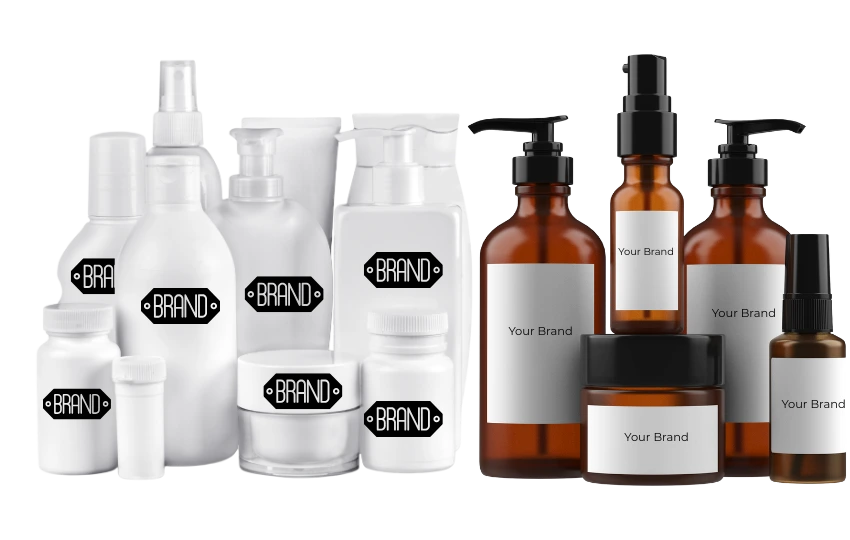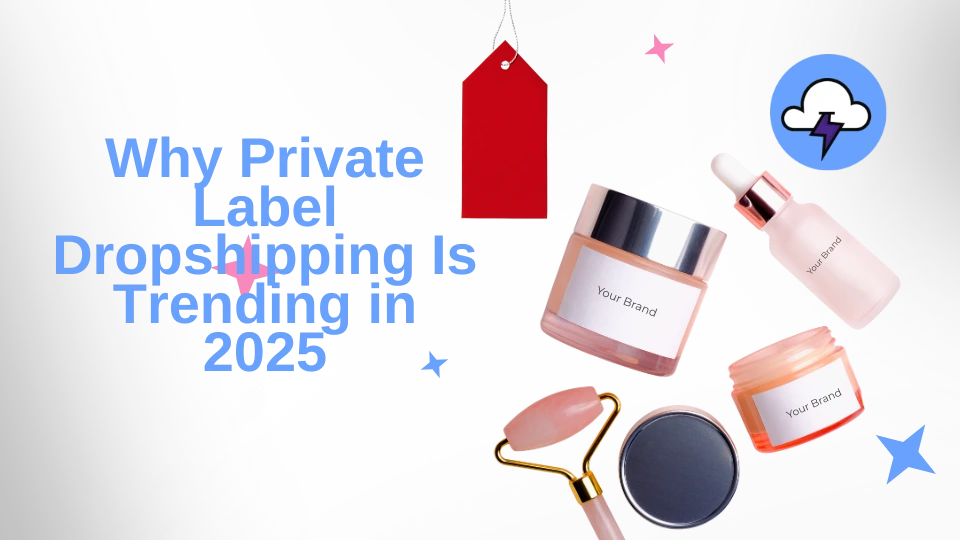Private label dropshipping is a unique business model that allows entrepreneurs to create a distinct brand by customizing products and selling them with their own branding. Unlike traditional dropshipping, where you sell generic products, private label dropshipping lets you build a stronger connection with customers by offering unique products. However, like any business model, it comes with both rewards and challenges. In this article, we'll dive into the pros and cons of private label dropshipping, provide real-world examples of success, and guide you through how to get started.
How to get started with private label dropshipping
Getting started with private label dropshipping might feel overwhelming at first, but it’s completely doable—especially when you break it into simple steps.
First, define your brand identity. Think about your mission, values, and the kind of vibe you want your brand to give off. Are you sleek and minimal? Bold and edgy? Fun and eco-friendly? Your brand identity will guide every decision—from the look of your packaging to how you market your products.
Next, choose a product that aligns with your brand and has strong market demand. Use platforms like Google Trends, Amazon, Etsy, or even TikTok to spot trending items. You want something popular but with enough room to stand out. The beauty of private label dropshipping is that you can customize the product, packaging, and messaging to make it your own.
Once you've found your product, the next critical step is choosing the right supplier. Look for private label-friendly suppliers who allow custom branding, offer quality assurance, and provide clear lead times. Building strong supplier relationships from the start will help prevent headaches down the road.
And if you're thinking long-term, it’s also smart to consider working with multiple suppliers. This spreads out your risk and gives you more flexibility with pricing and inventory. For a deeper dive, check out the SuperDS blog on Key Advantages of Having Multiple Suppliers for Business—it’s packed with tips on how to build a supplier network that supports real growth.
Partnering with a supplier

Now that you have your product in mind, the next step is finding a supplier that offers private label options. You want to work with a supplier who will allow you to customize the product with your branding and packaging. Make sure to vet potential suppliers carefully to ensure they can deliver products of the quality you expect, and check that their shipping times are acceptable.
Building your online store
After securing your supplier, it's time to build your e-commerce store. Shopify and Wix are popular platforms for dropshipping businesses, offering customization options to make your store look professional and appealing. Your website should reflect your brand identity and provide a seamless shopping experience for your customers. You can also integrate tools to streamline product imports and order fulfillment.
For beginners, SuperDS also published How To Start Dropshipping For Free: A Complete Guide—a must-read if you're new to the game.
Marketing your brand
Once your store is set up and your products are live, it's time to market your brand. Utilize social media platforms like Instagram, Facebook, and TikTok to showcase your products. Engaging content, customer testimonials, and effective use of paid ads can drive traffic to your site. Don’t forget to build your email list for continued customer engagement.
Want an edge in visibility? Check out SuperDS’s blog on eBay SEO Tips: How to Rank Higher and Get More Sales in 2025 for strategies you can also adapt for Google and social platforms.
The pros of private label dropshipping for eCommerce brands
Private label dropshipping comes with several key advantages, especially for entrepreneurs looking to build a strong, recognizable brand. The most notable benefit is brand control—you’re not just selling a generic product but one that you’ve personalized to suit your target audience. This allows you to create unique packaging, design product features, and even customize the product itself, giving your brand a distinct edge in the marketplace.
Another advantage is the potential for higher profit margins. Since you control the branding, you can price your products higher than generic, white-labeled items. Customers are often willing to pay more for products that feel unique or premium. Moreover, by offering exclusive products, you reduce the risk of price wars with competitors, ensuring more stability in your pricing and profits. To help you effectively manage your product listings and branding, Superds offers tools to streamline your eCommerce process (eBay), giving you an easier path to success as you scale.
The cons of private label dropshipping you should know
While private label dropshipping can be a lucrative business model, it comes with its own set of challenges that require careful consideration.
Higher upfront costs
Unlike white-label dropshipping, where you can start with little investment, private label dropshipping requires a higher initial investment. Customizing products, designing packaging, and branding your items can be costly. You also need to factor in the cost of product samples, shipping, and the time spent setting up your store. It's important to be financially prepared for these expenses before diving in.
Longer lead times for product launch
Another significant challenge is the longer lead times. Private label products require customization and prototyping, which can delay the product's availability. While white-label products are ready to be sold immediately, private-label products may take weeks or even months to go from concept to market. This slower process can also increase the risk of launching a product that doesn't resonate with your target audience.
Supply chain management and quality control
Since private label dropshipping relies on third-party manufacturers, managing the manufacturing process can be tricky. Quality control becomes crucial to ensure that the products you sell meet your standards. Issues with delayed shipments, manufacturing errors, or low-quality products can damage your brand’s reputation. Maintaining consistent communication with your suppliers is key to ensuring that everything runs smoothly.
Risk of unsold inventory
With private label dropshipping, you may also face the risk of unsold inventory. If your products don’t gain traction in the market, you could be left with stock that’s difficult to move. Unlike traditional inventory-based models where you have direct control, private label dropshipping depends on demand and market trends. If the product doesn't sell as expected, it can lead to excess inventory and financial loss.
Real-world examples of private label dropshipping success
Private label dropshipping has proven successful for many entrepreneurs. Let’s take a look at five businesses that have mastered the model and made it work for them.
Dr. Squatch
Specializing in natural men's grooming products, Dr. Squatch is a prime example of a successful private label business. By offering custom-made soaps and grooming products with unique branding and focusing on the men's grooming niche, Dr. Squatch has differentiated itself from generic competitors.
Hyperice
Known for its high-quality massage guns, Hyperice has capitalized on the wellness trend by private labeling its products. The professional branding and marketing of their massage guns have positioned Hyperice as a premium brand, demonstrating how strong branding can lead to premium pricing.
Allbirds
Combining sustainability with comfort, Allbirds has used private label dropshipping to create eco-friendly shoes that appeal to conscious consumers. Their brand story, combined with customized products, has built a strong, loyal customer base.
Indestructible Shoes
This brand specializes in durable footwear, offering shoes that are marketed as "indestructible." The unique selling proposition of toughness combined with private label branding has garnered them a loyal following willing to pay a premium.
Printful
Printful is a popular print-on-demand supplier that allows entrepreneurs to create private-labeled products like apparel and accessories. Many Printful users have achieved success through private label dropshipping by using the platform's customization options to create branded items without manufacturing costs.
Conclusion
Private label dropshipping is an excellent business model for entrepreneurs who want to build a strong, recognizable brand and offer unique products to their customers. While it does come with higher upfront costs and longer lead times, the ability to control your branding and customize products makes it a powerful long-term strategy. If you're just getting started, tools like SuperDS can help you launch faster by simplifying the basics of dropshipping—so you can start lean, test products, and grow into private labeling with confidence. It’s a smart way to build momentum while preparing to invest in your own branded line.
Ready to build your own brand?
Start your private label journey today and begin creating products that will set you apart from the competition!
